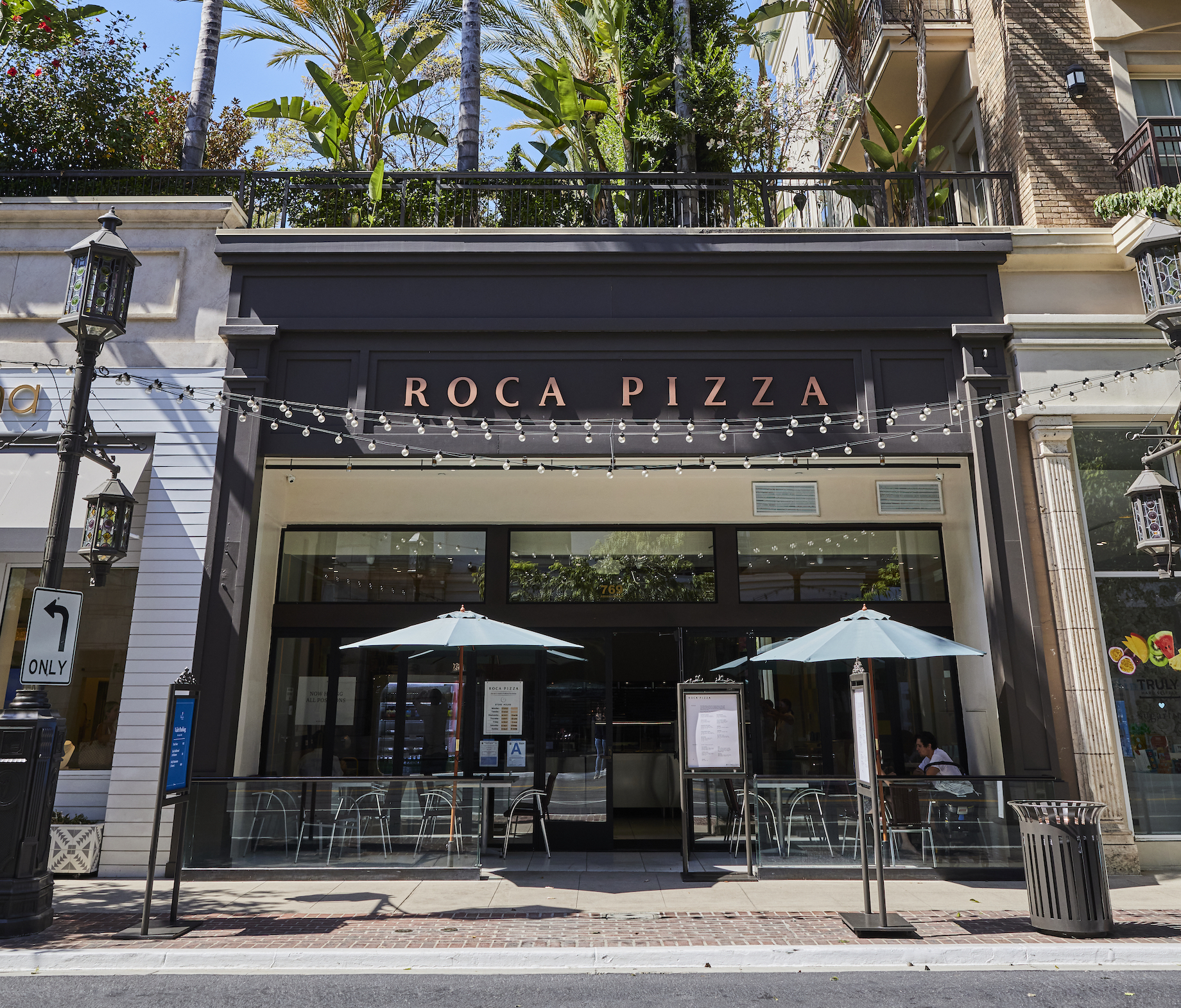California Pizza Kitchen co-founder Rick Rosenfield hopes his new restaurant concept will do for lifestyle centers what CPK did for malls in the 1980s, when it became the first upscale restaurant in the shopping center space, changing the food court game forever.
Rosenfield and COO Steve Rich, former CPK senior vice president of development, opened their first Roca Pizza in September, offering Roman-style, by-the-cut pizza in a pop-up at The Americana at Brand in Glendale, California. Now, they’re expanding to several of local developer Rick Caruso’s other Los Angeles-area properties: A location will open this fall at Palisades Village in Pacific Palisades, and another is coming to Waterside at Marina del Rey by March 2022.

Roca Pizza's first location, at The Americana at Brand
The name Roca combines the pizza’s Roman origins with the brand’s California roots. The idea came to Rosenfield before the pandemic, while he and his wife Esther experienced the unique style of local pizza while traveling in Rome. “The Roca pizza is a different style of pizza,” he said. “To see it is to understand it. It is like a bakery good, and when you come in, you will have a long line of 15 to 20 pizza choices that are sitting like a bakery and it is very visual.”
That visualization is an important component in the concept’s location strategy. “We want to be in high-traffic areas to introduce the brand where people can see it,” said Rosenfield. “Our whole goal will be to set up these little flagships in high-visibility centers and then to supplement that by doing ghost kitchens or virtual kitchens so people will have easier access to deliver it to them.”
Rosenfield admits the concept is still in its formative stages, as the first locations allow testing of physical formats and menus close to home. “Pre-pandemic, it was becoming very obvious that there was a paradigm shift in the industry towards takeout, delivery, third-party,” said Rosenfield. While CPK’s typical location was 4,500 square feet, “at Roca, we don’t know yet, but it is likely somewhere between 1,000 and 2,500 square feet, fast casual, principally designed for takeout and delivery. But our model also does allow for indoor seating.”
Rich said: “When we look at square footage today, one of the benefits that we have are the ghost kitchens and the virtual kitchens that are popping up all over the place by the day. We can take some of that internal pressure off the restaurant operations and siphon it to an off-site facility, which allows us to serve our customers really well. It really has opened up a lot of opportunity for us to look at things in a different light than we have in the past. Ghost kitchens pre-COVID were just starting, and there were only a few. Now, we are getting calls many times a week on those opportunities.”
They will launch in Southern California and then move into the Southwest. They’re open to franchising if the right opportunities arise. CPK’s only franchisees came early in the chain’s development and included Las Vegas hotel magnate Steve Wynn, as well as Caruso.
Roca will work best in streetside retail locations, but its small footprint can work wherever an upscale flavor is involved. “We are positioning Roca as a premium brand, and Steve and my DNA is to find the most upscale neighborhoods, the ones that will appreciate us the most and appreciate the quality the most,” said Rosenfield. “We are in the infancy of building out our menu, and so every note that we are trying to hit is an upscale note. We know the best neighborhoods, and of course, when you go in the best neighborhoods, it gives you price elasticity.”
Building on the CPK experience
Rosenfield credits much of CPK’s early growth to ICSC’s annual ICSC RECon conference in Las Vegas, when Steve Wynn became an early investor in 1985. He ultimately opened a CPK in his new Mirage Hotel and Casino in 1989. “It was those relationships we built by going every year to that convention that gave us our pipeline from which we could build out CPK,” Rosenfield said.
The CPK strategy was to place units in large, upscale malls to offer an alternative to the usual food court options. Opening locations between 1983 and 1985 at Beverly Center and Topanga Plaza in the Los Angeles area and Lenox Square in Atlanta, CPK brought a new market to casual dining, and Rosenfield built his brand on meeting the consumer needs of the time.
Rosenfield will tap into many of the key players involved in CPK. “We do intend to leverage our relationships as we build out Roca with all these developers because they are smart people,” he said. “They are adapting to the times. They know what is going on out there. We all know the pandemic has changed things, and now you see the executives of these companies talking about the ‘stickiness’ of third-party delivery. And even though … people are coming back into the restaurants, they are still seeing a great deal of their sales maintained in takeout and delivery because the customer is now used to that.”
By Ben Johnson
Contributor, Commerce + Communities Today